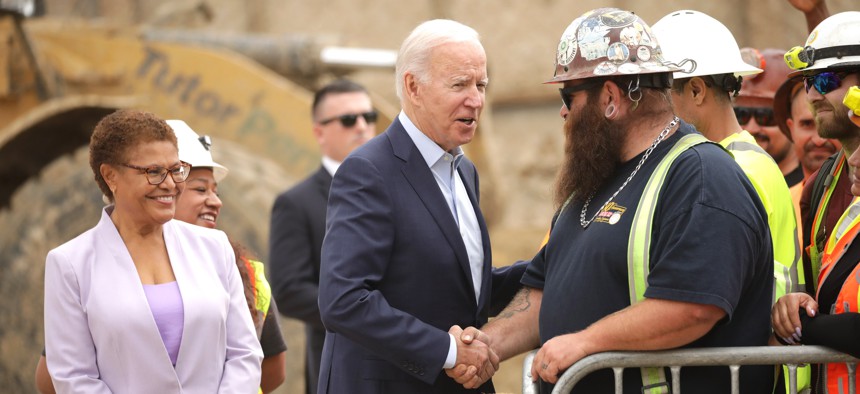Republican Governors Blast Biden for Infrastructure Labor Plan

President Biden visits a construction site in Los Angeles in October. Irfan Khan / Los Angeles Times via Getty Images
They’re at odds over a proposal calling for contractors to agree to project-specific labor standards on federal job sites.
Nineteen Republican governors formally objected to Biden administration plans that would require contractors to use special agreements setting labor standards on large federal infrastructure projects, reinforcing the deep divide between the GOP executives and the Democratic president.
The group of Republican governors, headed by Asa Hutchinson of Arkansas, said a proposed rule from several federal agencies calling for project-specific collective bargaining deals—known as project labor agreements—would “undermine taxpayer investment in billions of dollars of forthcoming public works projects.”
The Biden administration wants to require the agreements for any federal construction project that costs more than $35 million. The pacts between building trade unions and contractors govern pay and conditions for all workers on a project, regardless of whether they are union members.
The proposal would only apply to projects directly built by the federal government, like levees built by the U.S. Army Corps of Engineers or highways built on federal lands. But it would not cover most highway construction, because those are usually state projects that use federal money.
Still, the Republican governors said the proposal could have far-reaching effects.
“Reducing competition from some of the best union and nonunion construction firms and workers will exacerbate the construction industry’s skilled labor shortage, delay projects and increase construction costs by estimates of 12% to 20% per project, which will result in fewer infrastructure improvements, less construction industry job creation and higher taxes,” they wrote in their comment letter.
A national group of roadbuilders also warned about potential downsides of the regulation.
The American Road & Transportation Builders Association predicted that the rule would drive up costs for taxpayers, because fewer companies would bid for work on federal projects. Non-union companies would not want to be subject to union rules, and even some companies that normally work with union workers might not want to be subject to project-specific rules that could conflict with existing arrangements, the industry group wrote.
The roadbuilders said extra expenses from the work agreements would add to costs at a time when inflation and supply shortages have already driven up prices of construction projects. The higher costs could limit the impact of the federal infrastructure law that Congress passed last year, the group argued.
“As federal agencies work with all parties to deliver on the [Infrastructure Investment and Jobs Act’s] promise, the proposed PLA mandate is ill-timed and ill-advised. This is not the time to risk further increases in project costs or disruptions to project delivery,” the group wrote.
Meanwhile, labor groups disputed the assertions that the agreements increased costs. They also claimed the arrangements led to wider economic benefits.
The Laborers’ International Union of North America, for example, noted that the agreements had been used by the public and private sector across the country for decades.
One of the biggest benefits of the agreements, LIUNA wrote, was that they provide construction workers with training and apprenticeship programs.
“The market failure produced by a seasonal, cyclical and lowest-bidder employment model in the construction industry frequently encourages the shedding, by contractors, of costs associated with workforce development,” the group wrote.
“At times of construction ‘booms,’ such as we are experiencing currently and for the foreseeable future, lack of available skilled workers becomes a clear impediment to the economic and efficient procurement of construction services for the federal government,” it added.
Two groups of electrical workers argued that widespread use of project labor agreements promoted efficiency on the worksites, which would reduce, rather than increase, project costs.
“PLAs reduce administrative costs, improve coordination and consistency, and prevent cost overruns and project delays that can be fatal to successful project completion. PLAs also ensure that projects are completed to the highest quality standards, minimizing the need for work to be redone later,” the International Brotherhood of Electrical Workers and the National Electrical Contractors Association wrote
The Economic Policy Institute, a left-leaning think tank, argued that studies of state and local projects that used project labor agreements found that they did not decrease the number of bids for work or increase costs
“Research shows that project labor agreements help ensure construction projects are cost effective, completed in a timely manner, and provide workers with fair wages and benefits,” the group wrote.
Daniel C. Vock is a senior reporter for Route Fifty based in Washington, D.C.
NEXT STORY: 800 miles apart, smart city partners share broadband insights






